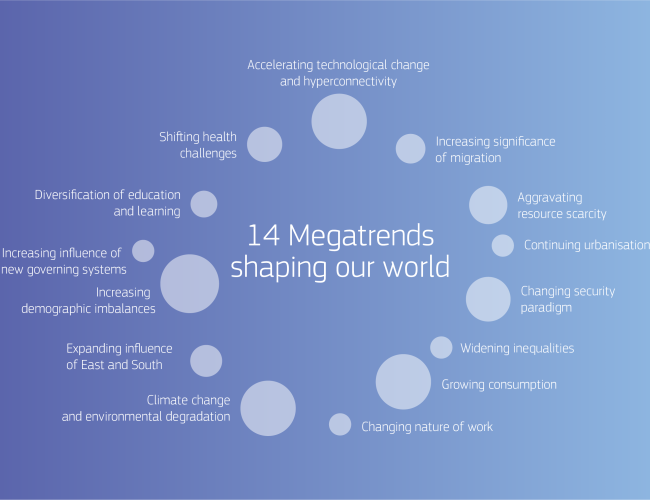
Accelerating technological change and hyperconnectivity
There is a growing impact of technology and digital connectivity on how we live, from how we socialize and work, to production and governance.
Aggravating resource scarcity
Demand for water, food, energy, land and minerals is rising substantially, making natural resources increasingly scarce and more expensive.
Changing nature of work
New generations entering the workforce and older generations working longer are changing employment, career models, and organisational structures.
Changing security paradigm
The diversification of threats, and the people behind them, are generating new challenges for the defence and security communities, and to society as a whole.
Climate change and environmental degradation
Continued unabated, anthropogenic pollution and greenhouse gas emissions will further increase changing climate patterns.
Continuing urbanisation
People in search of better opportunities - such as jobs, services and education - have been moving from rural, to urban areas across the world, and this accelerating trend…
Diversification of education and learning
New generations and hyperconnectivity are rapidly changing both educational needs and modes of delivery.
Widening inequalities
The absolute number of people living in extreme poverty has been declining. But the gap between the wealthiest and poorest of the population is widening.
Expanding influence of East and South
The shift of economic power from the established Western economies and Japan towards the emerging economies in the East and South is set to continue.
Growing consumption
By 2030, the consumer class is expected to reach almost 5 billion people. This means 1.3 billion more people with increased purchasing power than today.
Increasing demographic imbalances
The world's population will reach 9.7 billion by 2050, with rapid growth mainly in Sub-Saharan Africa and stagnating numbers of residents in the majority of developed countries.
Increasing influence of new governing systems
Non-state actors, global conscientiousness, social media and the internationalisation of decision-making are forming new, multi-layered governing systems.
Increasing significance of migration
The societal and political significance of migration has increased. Migration dynamics have become more complex in an interconnected world.
Shifting health challenges
Science and better living standards have reduced infectious diseases. Unhealthy lifestyles, pollution and other anthropogenic causes are turning into health burdens.
Share this page
